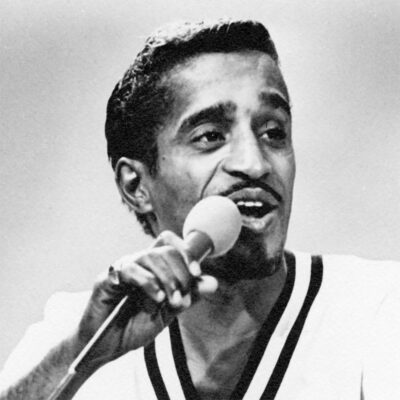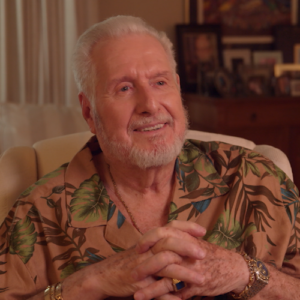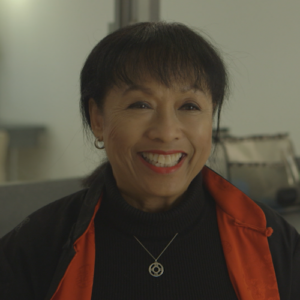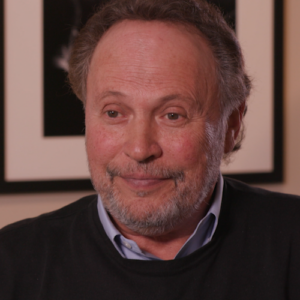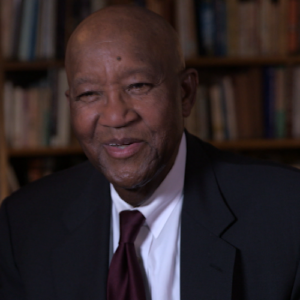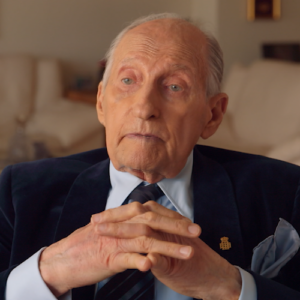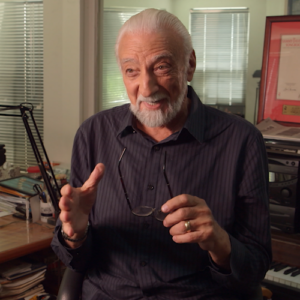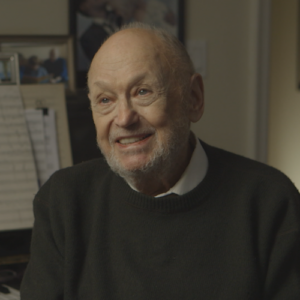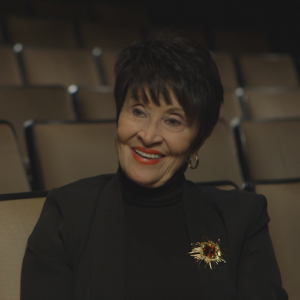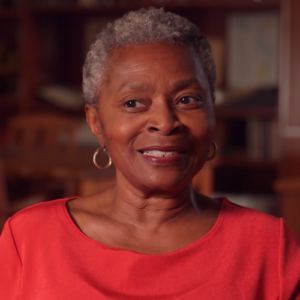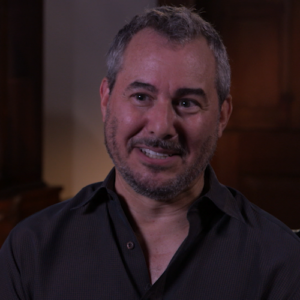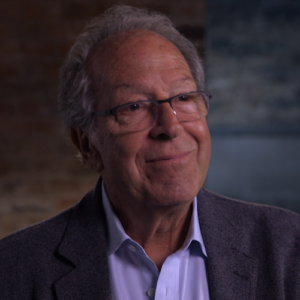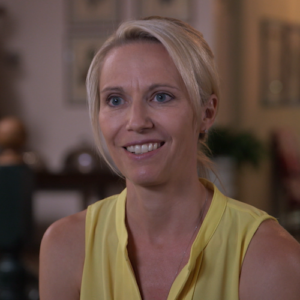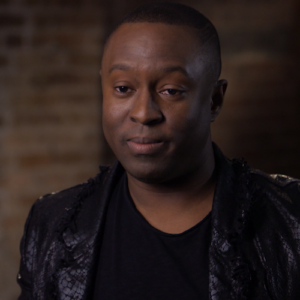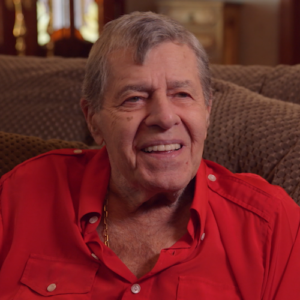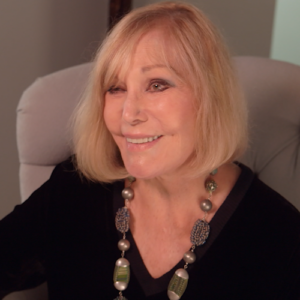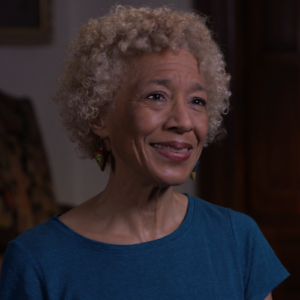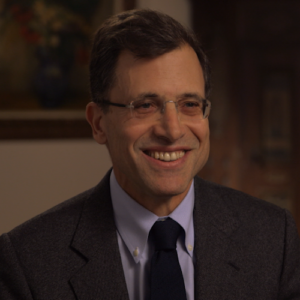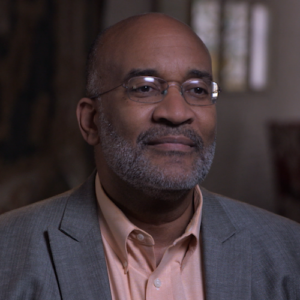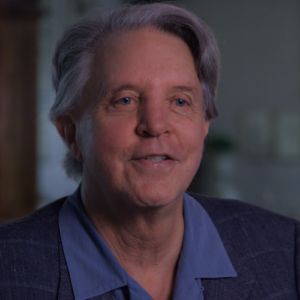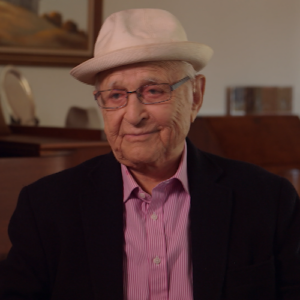Interviewer: So here’s our broad question we ask everyone.
Paula Wayne: Okay.
Interviewer: Any way you want.
Paula Wayne: Okay.
Interviewer: Who was Sammy Davis Jr?
Paula Wayne: Boy, that’s a complicated question. There were many sides to Sammy Davis, but the side that I knew, aside from him being a marvelous entertainer, which everybody knows, he was a wonderful human being. He was generous, he was kind. And I adored him. He was a very good friend to me. And that was my Sammy Davis.
Interviewer: Wow. That’s great. Our documentary is called The Many Lives of Sammy Davis Jr. Give us a quick sense from your perspective, what were some of those lives? He had so many different roles on stage, off different talents.
Paula Wayne: Well, let’s just say when we were doing Golden Boy every single night, practically after we would bring the curtain down, he’d have a different charity for us to go to always. We worked a lot because he was a very generous human being. And then it was he was the life of an activist. Don’t forget, that golden boy was right in the middle of of Selma, Alabama, of of the Watts riots in California. The riots in Detroit. And he he was there all the time. He was there right there leading everything with Dr. King. And he was there with Sidney Poitier and Diahann Carroll. They all met at the theater and flew out to Selma. And that was his life. He was a wonderful father. He loved his children very, very much. I don’t know if he was a wonderful husband because I never asked my Brit, but I guess he was. But I can tell you that he was a wonderful friend to me.
Interviewer: Let’s go back on that idea that, you know, doing a Broadway show is grueling.
Paula Wayne: Oh, boy. Is it ever.
Interviewer: Speak to you know, he’s the lead in a Broadway show. And on when needed, on occasion, he’d go do these civil rights thing. And was that important to him?
Paula Wayne: Yes, it was. It was He I don’t know how to explain it. I don’t think that Sammy ever realized how much he contributed to the fact that there is and this sounds naive and forgive me, but I believe it. I don’t know what anyone’s color has to do with anything or their religion or anything else. There are people and Sammy knew that, and he fought for his people and his beliefs. And he didn’t just talk about it. He did it. He didn’t do it for the press. He did it because he believed it and he followed up. He was very strong. This little tiny man was very, very strong.
Interviewer: Great. Well, tell me and again, we ask this of everyone. When did you first become aware of, you know, someone named Sammy Davis Jr?
Paula Wayne: Oh, my God. From the moment I started to breathe, I think. I think everybody knew Sammy Davis, Jr. Good heavens. Do you mind if I tell you a story? I’m from Mountain View, Oklahoma. A little tiny town in Oklahoma. And I got to New York and I many shows later I was in a show called Best Foot Forward with Liza minnelli. That was the first show she had done. She was 15 years old. And Charles Strauss, his wife, saw me in my best foot forward and told Charles Strauss, you’ve got your lawn moon. You have to see her. So I got an audition for Golden Boy, and I auditioned for a year. For a year. They brought in every star they could think of. They brought in every body that they could think of that could sing as well as I was did, and could look as good as I did. And in the end, I got the part for a very simple reason. I’m only five foot two and Sam was only five foot six. So that was. So I auditioned and then finally I was going to do the final audition for Sammy Davis, and Haley Elkins was in the audience and everybody and Sammy was there and I was supposed to do I want to be with you, And Lorne is here. So I did. Lorne is here. And then Sam said, Now we’ll do I Want to Be with you. And he walked across the stage and I. I couldn’t do anything. My throat closed up. I was in such a panic. I mean, this that was like for me in show business, like the Statue of Liberty walking to you, you know, it was just unbelievable. So I ran off the stage and I ran across the street to Sardi’s because Vincent Sardi’s has always been very nice to me. And I’m sitting at the bar and I’m crying my eyes out because I blew it. I blew a whole year of my life, and I made a fool out of myself in front of the biggest star in the world. And I feel this arm around me. And he said it was Sammy. And he said, Honey, am I that bad? And I said, Well, I don’t know if you’re that bad, but you’re certainly that big. And he said, Come on, we can do this. Can you imagine that? That’s. That was Sammy Davis to me. So we walked across the State Street and we went back up on the stage and I sang my heart out with him. And I got the part because I was also shorter than he was.
Interviewer: Wow. That is a great, great story. Thank you. You knew what the part entailed, i.e., an interracial love story.
Paula Wayne: That never occurred to me. Put that in. It never, never, never occurred to me. Ever. I had no idea of the firestorm that was about to happen to me. None. Absolutely none. When all of the hate started coming in and in when we opened it in Philadelphia at the Shubert Theater, it was a closed end alley and I walked out going down that alley. It was full of people. I figured they were there to see Sammy Davis, my God, of course. And there was this mumbling about, I don’t even know if I should say this on air, but it happened. They said, She’s the one that kiss that has that gravy, you know, it was so awful. And they surrounded me these 12. I thought 12. And I don’t maybe one more, but the whole all of those people who were out there were saying nothing, nothing to protect me. I was stunned. And so finally, Charles Draft Marie Adams came around the corner and I said, You’ve got to help me. And of course, bullies, if they’re confronted with somebody, back off. So they did. And we went around the front of the theater and we went back to Sammy’s dressing room and told him what happened. And he said, I was afraid of that. And from that time on until we got to New York, I had police protection. Everywhere. Isn’t that awful? But in answer to your question, it never occurred to me. It could have been polka dot for all I cared. He was Sammy Davis Jr, for heaven’s sakes. What an honor to play opposite this magnificent talent. It was wonderful. A sudden, the fact that people shot at me, too, that was not so wonderful.
Interviewer: But what. What happened with that?
Paula Wayne: There is a picture of Sammy and I that was taken by Milton GREENE. That was the cover of the book that they sold in the lobby. And it was also on a big billboard outside. And it was one Wednesday matinee. I always went across the street, disparities between shows. And I hear this rat a tat tat tat tat tat. And I looked at and some guy had taken a submachine gun. Really? To this poster. To this big poster. And he saw me coming out the side door and he turned the gun on me. Fortunately, the door was there and it didn’t hit me, but a piece of wood did. And it landed right there. So I got very lucky that he missed. It was quite an interesting time.
Interviewer: So he shot up the poster?
Paula Wayne: Yes. And that’s when they took it down and put up the saw best drawing that, you know, was just a I guess, a representative of it. Not not the pictures. You seem shocked by this.
Interviewer: That story I had never heard. And. You know, it seems it’s what we were talking about before. So topical like it, too.
Paula Wayne: That’s exactly right. That that the work that Sammy did and the work that Harry Belafonte and Sidney Poitier, all of them did. All of them did for it all to to to fall down under this morass of hatred again. It’s awful. It’s wrong.
Interviewer: And my next question was the story about the klieg lights set up again, being in this environment of of tension. There is things are happening outside. There is, you know. Well, speak, I guess in Detroit. There were.
Paula Wayne: There were. Well, what happened was now we we landed Golden Boy. We were at the Fisher Theater where we landed in the middle of the Detroit riots. So I went to work in a bulletproof police car. That’s how I went to work. And the audience had to have a you know, how they do at the airport, those wand things, all of the because there’s so many threats. Oddly enough, not against anybody but me. Isn’t that strange? I guess they couldn’t get to my breast, so they thought I was a good substitute. I don’t know. Anyway, we were. We were obviously a little concerned. So as I said, I went to work in a police car and the police officer always stood outside my dressing room and we were in the middle of the show. And, you know, I want to be with you, the love scene. And Sammy kissed me. It’s part of the scene and a big play like went like that and it sounded like a rifle shot. And the audience went, Oh, and Sammy wore a body, Mike. I didn’t have to. I got a big mouth, What can I say? So, but quickly, Sammy turned me around and put his back to the audience and tried to cover my body. And I started to laugh and he said, What the hell are you laughing at? And I said, Sam, no matter where that bullet goes, it’s got to hit me. I stick out on all sides of you. And the audience got hysterical laughing, and it blew away the moment. And we went right back and did the rest of the show. But that says what I know about Sammy Davis. His humanity and his bravery. And aside from all of the talent which has been covered numerous times. I knew him as a wonderful, wonderful human being who put himself out on a limb for me. A lot of times.
Interviewer: So Sammy’s first instinct, unlike probably mine and many others, would be to get off the stage. Tell us what what was his instinct to do to protect you?
Paula Wayne: He just threw himself and he turned me around because the scene was side to side. He quickly turned me around and put his back to the audience and put his arms around me. Like he was trying to protect me. See what I mean? That’s not a ceremony that gets advertised a lot.
Interviewer: Wow. Ted. Sammy, I overheard a great story that you were telling before and then misplaced my reading glasses, But I’ll find them later. About. Did Sammy understand really what it took to be ready for a Broadway show? What did Arthur.
Paula Wayne: Oh, no, he did not. Well.
Interviewer: Let’s just say Sammy had limited experience on Broadway.
Paula Wayne: Yes, well, he’d done Mr. Wonderful, which was just his. His nightclub act. So. So in that area, oddly enough, we were kind of on equal footing because he was stepping into my world, and I was good in my world. And he he would defer to me a lot as far as Paul. Is this am I, too? Is my face too far upstage? Am I doing things like that, which were very simple? But in Detroit, again, Arthur Penn had been brought in and William Gibson was there and they’d changed the book. And, you know, Clifford Odets died in the middle. And it just. Anyway, so Arthur Penn said Sam, and he always called him Mr. Penn. He said, Yes, Mr. Penn. He said, I want you in your dressing room at half hour and I want you to prepare. And sandwiched. Okay. So he came and he found me and he said, Paula. How do you prepare? Well, you know, Sammy had always the bodyguards and Murphy his dresser, and always someone in his dressing room. So I said, Sam, I don’t know how you prepare. I prepare my way. I don’t know. He said, Go with me. I said, Go with you to what? He said. Ask Arthur Penn how to prepare. And I said, he said, go ask him. I said, I’m not going to go ask him if he can fire me. He can’t fire you. You you go. So he said, Will you come with me? I’m going. I’m not kidding you. This is what happened. So I said, okay, I’ll go with you. So he goes up. He said, Mr. Penn, I want you to know that I am willing to prepare. I will do whatever you say to prepare. I just would like to know how you do it. And Arthur Penn looked at me, went, Oh my God, I’ve got the most expensive show ever put on Broadway. And my star does it know how to prepare? And Sammy said, I told you I’m willing to do it. I’m not kidding. He was a he was so funny. So he he really did. He really tried to stay in his dressing room by himself and prepare. And I think he was pretty religious about it. While we were in Detroit, however, when we got on Broadway, I’m not so sure he did for very long. I don’t know. Sami always got amused because I was so starstruck. I mean, I didn’t know all these people, you know, come on. And so he used to make me go up to my dressing room. I was on the second floor, which, by the way, he decorated for me and made it magnificent for a Broadway showroom. I mean, my makeup room, I had a really great one. And so he would make me go upstairs and then he’d send Murphy up to get me. And I go down and George Burns and everybody. And he loved to see me walk in the room and go, Oh, my God, that was. And he brought Muhammad Ali up once. And and Ali whistled in my dressing room. And I said, Excuse me, but you have to go outside, turn around three times and spit and say a dirty word. He said, What? I said, you just That’s a bad thing. You do not whistle in a dressing room. You have to go outside and take off the curse. And you can imagine Muhammad Ali and Sammy and Sammy says she’s not kidding. You really got to do it. So he did it. I just thought that was funny.
Interviewer: I love that. Yeah, I guess there’s that other thing about no hat on the bed or something.
Paula Wayne: Yeah.
Interviewer: Superstitions help for someone unlike us who do have a sense of what Golden Boy is about. My brother, for instance, he’d have no clue. Just in one or two lines. Tell us, what was Golden Boy about?
Paula Wayne: To strive for something higher and bigger in your life. And to fight any way you can to get it. That’s what I thought it was. The musical version of Golden Boy. It was about a very young, wonderful, talented man who lived in Harlem. And he was a good boxer. And they they wanted to make him a star and he wanted more out of life than that. So he strove to become a better man as well as a better boxer. And that’s what I think the story of Golden Boy was.
Interviewer: And what’s the love story within Gold?
Paula Wayne: That was interesting in the original movie with Barbara Stanwyck and William Holden. He was a violinist who who became a boxer and stuff, and he fell in love with his fight manager’s mistress. Now, in Golden Boy, what the twist was, it was the same thing. He fell in love with me, but I happened to be white. And that’s all it was. I happened to be white again. I could not understand the whole hoopla about black and white. I still don’t.
Interviewer: Did did that production of Golden Boy, do you think was in some way inspired by Sammy’s own personal relationship, being married to my Brett, etc.?
Paula Wayne: No, I don’t think so. I don’t think it had anything to do with it. I think it just that that they presented him with a great script and he thought it was timely. I don’t think, frankly, that he probably thought it was. Although he made a remark once that he thought I was the bravest person he ever met because I did this publicly, I didn’t get it. I didn’t think it was brave. I thought it was an honor to be on the stage with him. But it never occurred to me the black and white, and I don’t think it did him. I don’t know that. I don’t know that.
Interviewer: But after both the theater and you were shot at. Did it. What did it make you think both about your own commitment to this show as well as Sam?
Paula Wayne: I cannot. And I will not. To this day. Bring fear and hatred into my life. That was their problem. And as far as I was concerned, I was bulletproof. I. I know that sounds naive. But I will not allow anyone’s hatred to deter me from what I think I should do and what I should feel. And I think that that’s all I can say about that. Of course, I was afraid. Of course, I don’t want to be the one. I wasn’t afraid of the bullets, per se, although that sounds like a stupid thing to say. I was more concerned about when they brought the FBI in because there were there was a man who was who was riding me every day telling me things he was going to do to me. Finally, hell, he just stopped all my mail altogether that he was going to throw lie in my face. He was going to do all kinds of it. Now, the thing that turned out. That he was he was stupid. He mailed letters from the same post office box, obviously, with the stamp on it in New Jersey. And the FBI got on it because threats through the mail become whatever. And it was a black postman. Would you believe that? And then the white people, they spat on me that that was bad. Even after I left the show and went into nightclubs, it was bad scene. It was it’s an international thing. Hatred, I guess.
Interviewer: So you were getting hatred from both the white community?
Paula Wayne: Oh, yes. Yes.
Interviewer: That the black.
Paula Wayne: Yes, yes.
Interviewer: And put that you know, I mean, I admire your your fearlessness or your.
Paula Wayne: I’m not fearless. I just I just will not acknowledge and I will not to this day acknowledge hatred. I will not.
Interviewer: Put that in terms of Sammy. How did Sammy feel about all this and what was his stance?
Paula Wayne: I can’t answer that. I can’t answer that. I know that he he was proud of me and he was proud of what he perceived to be my bravery, which you seem to feel, too. I’m not brave at all. But he. I loved him. I loved him. He was my friend. I didn’t have a personal relationship with him. A romantic relationship, if that’s what you’re referring. He was my friend and I adored him and I trusted him and he trusted me. That’s all I can say about it.
Interviewer: No, that’s amazing. Let’s talk talk briefly about the the way that this big love scene evolved. The research we did said that the original director, this guy, Peter Coe, who was English, he wanted to have it done a certain way, but.
Paula Wayne: That didn’t he didn’t have any concept of what he was wrong for the show. He had directed Olive four, for God’s sake. He didn’t have any concept of of of the racial tensions in this country or or anything. It just he didn’t he was a very nice man.
Interviewer: Well, Sammy was involved in trying to make it.
Paula Wayne: Yes. Yes.
Interviewer: What would he offer it?
Paula Wayne: Well, he again, you’re you’re you’re talking about a man who was so involved in in trying to make things better for his people, if you want to call it his people, for poor people. And this man didn’t know how to do that. I mean, he. He didn’t even understand. 127th Street. He didn’t understand it at all. How could he was from London?
Interviewer: Well, that’s.
Paula Wayne: You know.
Interviewer: Let’s move on to Arthur Penn and so on. Apparently, according again, we weren’t there. You were. But Sammy is quoted as saying when we first said, I want to be with you. We didn’t even touch each other. I was scared of it. And one of the first things that Arthur Penn said was, I’ve never seen a love scene in my life where people don’t even hold hands, hold hands, kiss, do so.
Paula Wayne: Yes, he did. Yes, he did.
Interviewer: Well, that scene.
Paula Wayne: Again, Sammy didn’t want he didn’t want me to be hurt. He didn’t want that. I mean, you know, of course, they had all this hullabaloo with him marrying my. And he that was his way of trying not to hurt me. I said, Sam, you’re supposed to be in love with me. Aren’t you going to kiss me? Well, that’s a wise thing, Arthur Penn said. And then William Gibson wrote the scene when I renounced Sammy, when I renounced Joe Wellington, and when I had a predominantly white audience. Now, this is the truth. I played this scene with, Oh, William Gibson came in and he gave me the rewrite of the scene, which we had every other day. And he said, And I want you to play it this way. And I said, Mr. Gibson, I will say your words. They’re your words, and I respect them, but I will feel the way I feel. And you have to respect that. And I said, Ken, just let me go. If it was a predominantly white audience. I would play the scene with my back to the audience so that they could see my body language and know that I was hurting. If that was a predominantly black audience, which you could tell because they laugh at different things. Our two cultures. I would play it to the front so that they could see I was in pain, in mortal pain when I did it. Interesting, huh? And it worked. And he never argued with me after that. Because he knew that I knew. My people. And at this point in time, I knew Sammy’s people. It’s you that sounded like a stupid, racist thing to say, and I didn’t mean it. Culture. Culture. I knew his culture, and he knew mine.
Interviewer: You’re playing the audience.
Paula Wayne: Yes.
Interviewer: You are.
Paula Wayne: Well, when you’re in a dynamite situation like that, you either have to go with it or defuze it. And I chose to defuze it.
Interviewer: So at the end of I want to be with you, Sammy, we grabbed each other and kissed. And it was the first time that a man and a woman of different races had done that on the stage of full embrace in Detroit. What do you remember about sort of building up to that moment and that that’s a historic moment?
Paula Wayne: Yes, it was.
Interviewer: But but take us back and say we rehearsed the scene. We tried to make it more loving, whatever, and take us to that moment and tell us that it was the first.
Paula Wayne: Well, Sammy and I discussed it, and I should say I’m sorry.
Interviewer: You discussed what?
Paula Wayne: The scene, the love scene. He said, Paula, they tell me I have to kiss you. And I said, Well, is that such a chore? You know, come on. He said, You know, it’s never been done. And I said, Yes, so let’s do it. And he said, Are you ready for the aftermath? And I said, What aftermath is two people in love? Come on. They kiss. That’s what they do. And he said, okay, boy, when that klieg light blue in Detroit was doing that love, say, during that kiss, that was if that had really been a shotgun, I would have been dead on the spot. Probably. Sammy do. But you have to do you have to break down barriers. You have to. Otherwise, it’ll just stand there forever.
Interviewer: I think someone in the cast told us that there were boos. What was the audience to start with? At the moment we kissed and then tell us.
Paula Wayne: It depend on the audience. Sorry, I’m getting out. It depended on the audience. In Detroit. They were all you could hear. Oh, not so much on Broadway. Not so much on Broadway, but in Detroit. When we first put in the love scene, it was chancy. You know, you could hear them go, Oh. Isn’t that silly? Over a kiss.
Interviewer: You talked about the letters and the threats, boy. You talked about the klieg lights and the searching for weapons.
Paula Wayne: Well, that was in Detroit, right?
Interviewer: Do you think, Sammy? At the time of Golden Boy, he had so many other things going on. Do you think he ever overdid it and was trying to juggle too many things?
Paula Wayne: Oh, absolutely. Absolutely. I, I remember first of all, I don’t know how he thinks his body and his voice could be taxed that much. But if they said, Sam, would you do this? He just said yes. And he did too much. He did too much. I don’t know how he did it. It was I can tell you that at the end of a week sometime, I went into his dressing room and I said, If you’ve got any more shows that we have to do after the show, I have to bow out. I’m tired. And I don’t have to work as hard as he did. I don’t know how he did it. I guess he’s like the Energizer bunny. He just keeps on going. But he never, ever, ever. If one of his friends needed him or somebody near like when Nat King Cole died, he shot Golden Boy down. Then the dorm, Yom Kippur, golden boy shut down. Fiddler on the Roof was playing. That’s why I got to see it. It played and we were down. I think I can just say with true honesty that Sammy Davis Jr had the courage of his convictions.
Interviewer: How what part did did his religious beliefs play in that? Obviously, they show the showdown, but it was he. In your interactions was his.
Paula Wayne: Well, let’s say Sami practiced his own version of Judaism. I was raising my children in the Jewish faith, and I got it came Hanukkah and I was raised a Christian. So again, my belief is there’s one God, that’s it. I don’t care how you worship him and I do worship him, but I didn’t know the Hanukkah prayers. So I thought, who’s the best Jew? I know? So I called Sammy. I said, Sammy, do you know the Hanukkah prayers? Because I don’t know how to do them. And he says, No, I don’t. But my does, I’ll put her on. So my bread gets on the phone and she said, Are you ready? I said, Yeah, I’m ready. So she goes, But how do I? I don’t know. I let her know. So I learned the Hanukkah prayers with her Swedish accent. That’s how we all practice our old ways.
Interviewer: I guess that is a great story. Really great. Thank you. Let’s go back to Martin Luther King coming to the show. Do you remember that day?
Paula Wayne: Yes, vividly.
Interviewer: Tell us about that.
Paula Wayne: Vividly.
Interviewer: In the middle. Start with in the middle of the golden boy.
Paula Wayne: Right in the middle of the golden boy run was Selma, Alabama, as you know. And Martin Luther King. Came back and. I’ve never seen Sammy so moved. And because he was, I was. I guess we all were. But I can only speak for myself. I don’t want to talk in hyperbola. But you knew you were in the presence of. Greatness. Of real greatness. He was so soft spoken and so kind, and he was kind to all of us and. It was an honor to meet him, and I would have liked very much to have marched in Selma, Alabama. But Sammy’s understudy went on, and so I went on. But we did Broadway and saw Selma. You know that. We raised a lot of money. And we had a lot of every star in the world came.
Interviewer: One was Broadway and her son.
Paula Wayne: Sammy wanted to raise money and awareness, and he asked all of us if we would perform and everybody we knew. Performed. I have a funny story about Tony Bennett, if you want to hear it. I was going to play the Copa after I left Golden Boy, and they said, Well, Tony Bennett’s in town. We’d like to have Tony come and but he won’t. And I said, Yes, he will. So I called him and I said, Tony. We need you to perform for Broadway and answer Selma. And he said, Well, I can’t. And I said, I tell you what, I’ll make a bet with you. Do you think I can go into the Copacabana unescorted? He said, Absolutely not. Well, I had to go there because I hadn’t played a nightclub and I was opening at the Copacabana, for heaven’s sakes. And Julie Foudy always felt fond of me. He liked me. So I said, If I can get Julie Podell to let me go into the Copa by myself and watch a show, will you do go where you do Broadway, Anse or Selma? He said, Sure. It’s an easy bet. He won’t do it. He did. And Tony had to perform. So there you go.
Interviewer: That’s great. I believe there was one particular song that Martin Luther King liked and sort of adopted. Can you speak about that?
Paula Wayne: I’m not sure which song you’re speaking of.
Interviewer: No more. No.
Paula Wayne: Oh, yes. Oh, yes. Oh. That became his anthem.
Interviewer: To tell us about. Just, you know, there is a song.
Paula Wayne: Well, it’s I am bound down no more. And it was like this anthem. And that’s. And he adopted it. Sammy insisted on that song being sung. He insisted on it because he knew it was. It was. Did you see it? Have you seen it?
Interviewer: Oh.
Paula Wayne: Was. I didn’t realize it. Dr. King had decided to adopt it, but he did. They sang it, apparently on a lot of his marches. As a matter of fact, I think I heard it the other day. Somebody singing it. It’s a great song. I ain’t bowing down no more.
Interviewer: You know? Oh. You’re still in such amazing voice. I want to ask you, is there was there a line from I want to be with you when you would sing to Sammy that. That still sticks with you.
Paula Wayne: You make me want to sing. You make me want to cry. Joe, I never felt. Think I’d feel again. I can’t think of the words that makes me cry. I don’t like to cry on camera.
Interviewer: Sammy was around right now. What do you think he’d be doing to help the kind of environment we’re in now?
Paula Wayne: I think Sammy would be broken hearted with what’s happening now. It’s like that. All the progress that we made. And I believe firmly that golden boy made a lot of difference in a lot of areas. Which theater can do? That’s the beautiful part of theater. Theater can make a difference. And I think we did. I know in my case, it taught me a lot about compassion and about. Oh, what is the word I’m looking for? Acceptance. I think he would be heartsick.
Interviewer: When you talked about the Copa, I believe, and I think Larry can correct me that he was the first African-American.
Paula Wayne: Yes. And he introduced me when when I signed for Golden Boy, he introduced me. He was at the Copa. So I was sitting at the table with Hilly Elkins, and I don’t know who else. And he said, Annette, my and we’re going into rehearsal for a Broadway show called Golden Boy. And I wanted you to meet my leading lady, Paula. Wayne and I stood up in the audience went, Oh, And he said, Who’d you expect? Hattie McDaniel?
Interviewer: And speak to how there were all these nightclubs and the Copacabana was the.
Paula Wayne: Yes. By the way, I was the next to the last act that closed it.
Interviewer: Okay. Oh, but speak to the nightclub scene now. That was the top. And now Sammy broke the door down.
Paula Wayne: He broke the door down. Everywhere he went. Everywhere he went. He broke the door down in theater. We were the first interracial couple to kiss on stage. He was the first African-American to to play the Copa. He did you know that when he played Las Vegas that he couldn’t stay in one of the hotels. Did you know that? Is that disgraceful? They wanted his talent, but not his color. Yeah, Senseless hatred is senseless.
Interviewer: You told me before you you stayed friendly with Sammy after the show finished. Sammy was famously kind of disinvited to the Kennedy inauguration.
Paula Wayne: Oh, that was awful.
Interviewer: Did he ever speak to you about that?
Paula Wayne: No, but I knew about it. I knew about it. It was disgrace.
Interviewer: What did you know about.
Paula Wayne: I know how hard he was. He that and you know, I’m not in a position to judge because I don’t know Frank Sinatra. I met him several times. But I’m confused as to why Frank Sinatra didn’t stand up for him. I am. Why? It’s wrong on so many levels, which makes you me anyway, question the whole Kennedy thing. I mean, I don’t deny he was a great president, and I know that I’m I’m kicking an icon, which I have no right to do because I don’t know anything about it. But from my perspective as Sammy’s friend and I don’t know if you realize that when Sinatra was on the downslide, Sammy yet Sammy Sammy had him on his show on his nightclub as a guest. So as a matter of fact, as much as Sammy adored Sinatra and he did, he loved him. He thought he was God. Sinatra owed Sammy more than to do that with the Kennedy administration. But having not invited to the inaugural and was wrong, it’s still wrong. And he was desperately hurt. I don’t think Sammy ever really, really completely trusted. Anybody. That’s just my gut feeling. I don’t think. I don’t think that he. Let himself. Really? Totally trust anyone. Except maybe he trusted Sinatra. And look what happened.
Interviewer: Do you think Sammy’s embrace of Richard Nixon? Why do you think? Why do you.
Paula Wayne: I honestly don’t know that that was before my time. I honestly don’t know if that had anything to do with it. But again, he’s the first African-American to be in the Oval Office and been greeted by Richard Nixon. I mean. He broke down a lot of doors.
Interviewer: There have been people who felt that his was his upset at not being included as part of the Kennedy administration. That made him very much want to praise the Republicans and.
Paula Wayne: Probably probably sounds like Sam.
Interviewer: Sammy said he was always afraid of. All he had was his talent. I don’t deserve all this. Why me? Why do you think he was so afraid of failure?
Paula Wayne: Because a. And again, this is just me and my opinion. Sammy was never allowed to be a child. You know, he was with the Will Mastin Trio when he was a tiny little person. And from what I have gleaned, again, this is not a fact. This is what I have gleaned. And my perception was that if he didn’t do a good show, he was not he was roundly punished, I don’t know, verbally or whatever. Whatever form that punishment took. But he was always trying to please. And he never thought that he lived up to that, ever. And I think that that stemmed from the time he was a tiny little boy with the Will Mastin Trio. Again, that’s just my opinion.
Interviewer: Were you ever part of other folks who told us about Sammy loved to spend money?
Paula Wayne: Oh, yes.
Interviewer: Were you did you ever see him just drop a ridiculous amount of money or throw a party? Well.
Paula Wayne: Yeah. Hello. He opening night of Golden Boy? He gave me a circlet of gold. Like you would not believe for my neck. God knows what he paid for that. And I know if he bought it, went into a camera store, he would buy 30 cameras instead of one. When we went out to shoot the Sammy Davis show in Los Angeles, I went to his house and he had the funniest thing I’ve ever seen. There was like a tube in the middle of the house, and that was his closet. And the clothes came down on a circular thing, like a cleaning store. But it came down and then it would go back. It was he was over the top all the time. All the time. I guess that’s how I died. Broke. I don’t know.
Interviewer: Why do you think there was?
Paula Wayne: Because he could. Because one wasn’t enough. See this? I can buy 20. I don’t want a Ford car. I drive a Rolls-Royce because I can. That was him proving to himself that he had made it. Would you believe this? The biggest entertainer in the world. And he didn’t believe it.
Interviewer: So you’re you’re is what you’re saying is he was trying to show other people?
Paula Wayne: Yes. Yes. Again, we’re going on my perception. Yeah. I don’t think Sammy ever thought he was good enough for anything, so he kept proving he was better and better and better. I don’t think he ever believed it. Witness. I’m perfectly capable. I want to prepare. If you just tell me how to do it. That kind of sums up everything. He was an amazing human being.
Interviewer: What do you think that the next generation of performers, whether it was then or even moving forward, what can they learn from Sam? People study is. Talents. Is it was it just was he so unique that there is nothing to learn or is there a lot that people can take from his story?
Paula Wayne: Do you think that? I think anyone can ever touch him. No. Because they won’t have his same life experience. How could they? I mean, they might matches dance moves, they might play the drums, play cornet, whatever they did, but they haven’t had his life experience. So, no, I don’t think so. What they can learn and what I learned is that hard work, hard committed work and a lot of luck and you can be anything you want to be that they can learn.
Interviewer: Again. Our film is called The Many Lives of Sammy Davis Jr. And he he did so many different things. And we’ve come up with just a list of different words, and we play this little game with interview subjects where I’ll throw out a word. And when you think of Sammy, what does it make you think of? Okay, If it doesn’t make you think of anything, that’s fine too. But. When you think of Sammy and I say the word hoofer.
Paula Wayne: Dancer.
Interviewer: Impressionist.
Paula Wayne: Sammy.
Interviewer: Singer.
Paula Wayne: Sammy.
Interviewer: Survivor.
Paula Wayne: Sammy.
Interviewer: Provocateur.
Paula Wayne: I’m not so sure about that actor. Sammy.
Interviewer: You acted with him? Yes. How would you describe his technique or his. Exactly?
Paula Wayne: Sammy had the one thing. That actors must have. Or don’t be in the profession. He listened. He always listened so that you could he would then react to his listening. I listened and I reacted back. That’s why the scenes were never the same, ever. That was, in my opinion, his greatest acting job was he listened.
Interviewer: Hipster.
Paula Wayne: No, that’s not Sammy. He wasn’t a hipster.
Interviewer: Well, Sam, he was very open about liking to party and.
Paula Wayne: Oh, well, I don’t know what your definition of hipster is. I think of those silly people out in San Francisco with their long hair and floppy stuff.
Interviewer: Yeah. No, you’re right. I’m moving on to this other topic. I don’t know, party or whatever. Why do you think Sammy liked to sort of both with money and with the partying. Sort of go to excess. What? To the money? You told me that was proving himself, proving something to himself. But was there another reason why you were so enamored of, like are stories where someone else is like, now let’s just call it a night and he just wants to keep going.
Paula Wayne: I was not a party to that part of his life. Sammy kept me very, very insulated. He said I was the only virgin he ever met that had two kids. So he didn’t. He didn’t let people his partying ways around me at all. So I’m afraid I’m not qualified to answer that.
Interviewer: Fair enough.
Paula Wayne: Patriot that he was Sammy.
Interviewer: What was it about the United States that he was sort of proudest of?
Paula Wayne: That he was fortunate to be born here and given the opportunities that he had that he don’t I don’t think he thought that he would have made it anywhere else.
Interviewer: And the last one is legend.
Paula Wayne: Sammy.
Interviewer: There’s definitely a legend. In in one of the songs says, Who do you fight when you want to break out but your skin is your cage? You think I identified with that?
Paula Wayne: Oh, absolutely. Absolutely. No question about it. All of these things that Charles and Lee worked on, they they sort of wrote them out of Sam’s mouth in the way he felt. Absolutely.
Interviewer: Great, Larry. Here, let me follow up on that. We interviewed Charles Strauss. Phil Gibson wrote a lot about how Sandy really wants to make sure the words had integrity, that they represented what was going on.
Paula Wayne: Yes.
Interviewer: What about black people? Bill Gibson, unfortunately, isn’t here anymore to tell that. But can can you talk about how influential was Sandy and making sure there was integrity in the story of a black kid from Harlem in 1964?
Paula Wayne: He if if he even smelt. That anyone was being a glossing over or he put a stop to it immediately. It was just not done. You either going to tell it with grit and truth or he didn’t want it in the script. That’s why we did so many scripts. My gosh, can you imagine? We did one show at night and then we slip in Bill Gibson’s scenes. And in the. It just it was. I don’t know why anyone even saw Golden Boy on the road, because we we did 55 different versions. But he was never Sammy. If he was going to do this and this is the only one I can personally tell you how he worked. If it wasn’t the truth, he wouldn’t say it. He didn’t want a glossing over it. He wanted the truth. And what do you do when your skin is your cage? I think that says it all, doesn’t it? But he. He didn’t want any any puttering around. He wanted the truth told.
Interviewer: How did he find the truth in the boxer? What did he. How did he reach out to. To figure out how a boxer.
Paula Wayne: I haven’t got a clue. I haven’t got a clue.
Interviewer: I thought at one point he reached out to a boxing champ.
Paula Wayne: Oh, he did? Paterson. Floyd Patterson.
Interviewer: Was it Sugar.
Paula Wayne: Ray or Sugar? Right. One of those people. I don’t know anything about boxers, but yes, they were there all the time, didn’t you? Oh, Larry, you saw Golden Boy, didn’t you?
Interviewer: Oh, dear. I wish I had more than.
Paula Wayne: Oh, because, boy, oh, boy. The first part of Golden Boy was just in the dark with drums. No music, just drums. It was amazing. And then the Foo Fighters up on stage and in the boxing ring. Wow. That was amazing.
Interviewer: Can you talk about. So it’s almost like playing Hamlet. Joe write. He sings eight songs at the end. He’s got a fight. And what a load that was.
Paula Wayne: Oh, yes.
Interviewer: So people get a sense of how because he was never on film, so people know how much he had to carry every day.
Paula Wayne: Oh, Lord. I don’t know how he did it. I really don’t know how he did it. He thought. And they weren’t kidding either. Oh, I must tell you that again, with Sammy’s honesty. Opening night in New York. In New York after the. I’m sorry, Larry. I’ll answer your question in a moment. This fight scenes were staged brilliantly and carefully so that we wouldn’t get hurt or he wouldn’t get hurt, certainly. But there was a scene in Central Park when Sammy and I were talking and really falling in love and a gang of white kids came up and started with chains to hit us again. This was very, very, very choreographed. And one of the kids, his was his first Broadway show, and his parents were in the audience and he lost focus. And it hit me with the chain. He cracked two of my ribs, so we had to bring them had them bring in the doctor from the Jets. And he patched me up during intermission and I went on for several weeks with him in my dressing room every night, taping up my ribs so I could work again. Back to your question, Larry. How did he do it? I couldn’t tell you. I don’t know where he got the strength. The the show started, as I just explained to you, with a fight scene. Then there was this to get let him get a breath. There was a scene, I believe, with Billy Daniels and and the fight manager that I was playing opposite Ken Tobey. And so then they let him change his clothes, and he came out and sang. And then he went back and the show went on, and he fought again. And then he sang and he danced. And he he to tell you how he did it. I have not got a clue, but I don’t think any actor today could do it. I really don’t. I don’t think they’d have the strength. But don’t forget, he was used to doing two shows a night in a nightclub, too. So vocal. He was strong. He was strong. And I. I don’t know where he got the endurance. He carried that show on his back. He did. He sang eight songs. And he fought in two fights. I don’t know how he did it. I really don’t.
Interviewer: Great. And just one thing that he canceled his show ready to go down, too. So I think it’s important that people know that.
Paula Wayne: I’m sorry. I thought I covered that.
Interviewer: Well, it just sort of did. But I mean, you get that you said he canceled the show for Yom Kippur, but I don’t get to the point. We actually canceled the show to go down to Selma.
Paula Wayne: No, what I said was he went down to Selma with with Diahann Carroll and Sidney Poitier. But we did the show. I went on with his understudy. I would have loved to have gone to Selma, but he chose not to have me go. Thought that I would be more of a distraction than a help. So I carried on with the show when he closed. The show was on Yom Kippur. And when? When that gentleman died, I forgot his name. Now, because I’m scared. Nat King Cole. I’m sorry.
Interviewer: Well, it sounds like you knew. Is it my or may.
Paula Wayne: My.
Interviewer: It? I mean, you. You knew her enough to call her for the for my.
Paula Wayne: On a couple hours? Yes.
Interviewer: Did, did she. And I guess they had one or two kids at that time. Did they ever come by the theater or were they.
Paula Wayne: Well, my mother lived with me at the time and Sammy adored her. By the way. My mother went to the opening of Golden Boy in a limousine, and I came in a taxicab, which they had. Should they only have one natural child? Tracy and the two boys are adopted. And they were there in New York. And Sammy had just gotten delivery of this Rolls-Royce I told you about. And so Mother took the children to see all the Christmas tree lights and stuff, you know, with his chauffeur. And they got his car back and it was full of cotton candy. So I think, yes, when we went to the circus, he would buy it all the all the cast brought all our kids. He was a wonderful man. He brought all this the cotton candy and the popcorn and everything. They brought in these trays of this stuff and the kids got sick from it. So, yes, but that’s when we were that’s when we we were with them with fun stuff like that.
Interviewer: Yeah. Well, it sounds like in a way, you had a much you know, it sounds as though and it never occurred to me that so much of the attention was focused on you. He was just a star, but you were somehow transgressing or you were the one.
Paula Wayne: He knew what he was asking me to do. I was not aware of it, as I said. And I’m not I don’t want to sound like a sap because I’m not. It just never occurred to me that anyone wouldn’t be thrilled to death to be on the stage with the biggest star in the world. I mean, my goodness. And he he knew what he did, everything he could to protect me. He knew what was coming. I didn’t. And he tried every way he could, as I said, to protect me. And he did. He wouldn’t let anyone near me. If anyone was going to do anything bad and he knew about it before, he would make sure that he tried to put a stop to it. I loved.
Interviewer: Him. Wow. Well, we love him in a different way, but things.
Paula Wayne: That I don’t think that anybody, at least to my knowledge and maybe I’m presuming too much, but I don’t think anybody knew Sam the way I did in the way I did. I don’t think so. Because don’t forget, we were on the road for a long time and then we ran on Broadway. And you get to know a person pretty well when you go through that. You really do.
Interviewer: You ran for over four years.
Paula Wayne: Yes.
Interviewer: Tell us that just you ran for.
Paula Wayne: Well.
Interviewer: I.
Paula Wayne: I wanted out after I was tired. I was tired of having my children walk to school with Pinkerton guards. I had reached saturated myself. I was finished, and Danny Thomas offered to take me on the road. And I asked Sammy. I talked to him about it. And so he brought in it. They brought in someone to replace me. And, well, they brought in my and my standby for a couple of weeks. And then they brought in another girl, which I will not name her name. And apparently immediately she slept with Sammy. This is what I heard. I don’t know that for a fact, but I told her. It doesn’t matter if you don’t do the job, you’re gone, you’re out. And two weeks later, you close the show.

